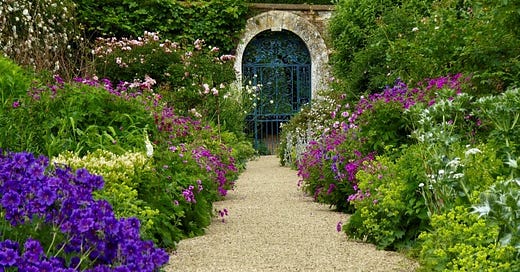If ever we see those gardens again,
The summer will be gone—at least our summer.
Some other mockingbird will concertize
Among the mulberries, and other vines
Will climb the high brick wall to disappear.
How many footpaths crossed the old estate—
The gracious acreage of a grander age—
So many trees to kiss or argue under,
And greenery enough for any mood.
What pleasure to be sad in such surroundings.
At least in retrospect. For even sorrow
Seems bearable when studied at a distance,
And if we speak of private suffering,
The pain becomes part of a well-turned tale
Describing someone else who shares our name.
Still, thinking of you, I sometimes play a game.
What if we had walked a different path one day,
Would some small incident have nudged us elsewhere
The way a pebble tossed into a brook
Might change the course a hundred miles downstream?
The trick is making memory a blessing,
To learn by loss the cool subtraction of desire,
Of wanting nothing more than what has been,
To know the past forever lost, yet seeing
Behind the wall a garden still in blossom.
From Interrogations at Noon—Published with permission by the author
Dana Gioia was born in Hawthorne, California, on December 24, 1950. He received a BA from Stanford University. Before returning to Stanford to earn an MBA, he completed an MA in comparative literature at Harvard University, where he studied with the poets Elizabeth Bishop and Robert Fitzgerald. In 1977, Gioia moved to New York to begin a career in business. For fifteen years Gioia worked as a businessman, eventually becoming a vice president of General Foods. In 1992, after publishing his first book of poetry, Daily Horoscope (Graywolf Press), in 1986, he left business to become a full-time writer.
Good News: Our Fall 2024 Journal Is Published!
Daedalus: A Dialogue (Preview)
A preview of my new 10,000 word dialogue, Daedalus, from our Fall 2024 issue of New Lyre Magazine
Keep reading with a 7-day free trial
Subscribe to Age of Muses to keep reading this post and get 7 days of free access to the full post archives.







